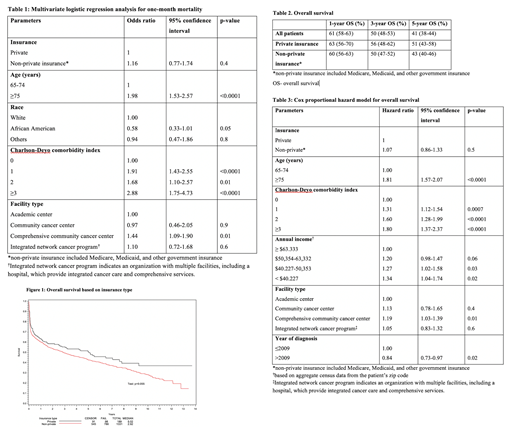Abstract
Introduction
Prior studies report multiple factors, including insurance status, as significant barriers to healthcare access in the United States. Barriers to healthcare access may lead to worse outcomes in APL, which requires timely diagnosis and prompt treatment. We performed a large database analysis to examine the effects of insurance type and other factors on one-month mortality and overall survival (OS) in patients ≥65 years of age with APL.
Methods
We aimed to compare one-month mortality and OS of patients on private insurance with patients on non-private insurance, which included Medicare, Medicaid, and other government insurance. Patients ≥65 years of age who were diagnosed with APL between 2004-2015 were identified from the National Cancer Database (NCDB). Multiple regression analysis was used to evaluate the effects of insurance type on the probability of one-month mortality. The Kaplan-Meier method estimated overall survival (OS), which was defined as the time from APL diagnosis to last contact or death from any cause. We used Cox regression model to determine the effects of insurance type on mortality risk adjusting for the other covariates of interest.
Results
We analyzed a total of 1520 patients- either private (12%) or non-private (88%), which included Medicare (85%), Medicaid (2%), and other government insurance (1%). Among total patients, 60% were 65-74 years of age, 46% were female, 87% were white, 84% had Charlson-Deyo comorbidity index (CCI) of 0 or 1, and 52% were treated at academic centers.
One-month mortality was 18% for patients with private insurance and 23% for patients with non-private insurance. In a multivariate regression analysis, insurance type did not affect one-month mortality (Table 1). One-month mortality was higher for older patients; patients ≥75 years of age were more likely to die at one month compared to patients 65-74 years (Odds ratio [OR] 1.98, 95% confidence interval [CI] 1.53-2.57, p<0.0001). Compared to patients with CCI of 0, patients with CCI of 1 (OR 1.91, 95% CI 1.43-2.55, p<0.0001), CCI 2 (OR 1.68, 95% CI 1.10-2.56, p=0.01), and CCI ≥3 (OR 2.88, 95% CI 1.75-4.73, p<0.0001) had worse one-month mortality. One-month mortality was higher for patients treated at comprehensive community cancer center compared to those treated at academic cancer center.
Median follow-up for surviving patients was 4.5 years (0.03-13.72). Three-year OS was 56% for private insurance and 50% for non-private insurance (Table 2, Figure 1). In Cox proportional hazard model, there was no statistically significant difference in OS based on insurance type. (Table 3). OS did decrease with increasing age. Compared to patients 65-74 years of age, the likelihood of death was higher for patients ≥75 years (Hazard ratio [HR] 1.80, 95% CI 1.57-2.07, p><0.001). OS decreased with increasing comorbidities: HR 1.31 (95% CI 1.12-1.54, p=0.0007) for CCI 1, HR 1.60 (95% CI 1.28-1.99, p<0.0001) for CCI 2, and HR 1.80 (95% CI 1.37-2.37, p<0.0001) for CCI ≥3 compared to patients with CCI of 0. OS was lower for patients treated at comprehensive community cancer center compared to those treated at academic cancer center. Higher income status and diagnosis after 2009 were associated with improved OS.
Conclusion
In our large database analysis, while insurance types were not associated with mortality in patients ≥65 years of age with APL, one-month mortality (about 20%) still remains high and only half of older adults are alive at 3 years. Our study highlights a significant effect of increasing age on mortality even among older adults, with approximately 2-fold higher risk of mortality among patients ≥75 years versus those 65-74 years. Other factors associated with higher mortality included treatment outside of academic centers and lower income status. Unlike younger adults, APL in older adults still has significant unmet need.
Gundabolu: Bristol-Myers Squibb Company: Consultancy; Blueprint Medicines: Consultancy; Pfizer: Research Funding; Samus Therapeutics: Research Funding; BioMarin Pharmaceuticals: Consultancy. Bhatt: Servier Pharmaceuticals LLC: Consultancy; Partnership for health analytic research, LLC: Consultancy; Abbvie: Consultancy, Research Funding; Jazz: Research Funding; Incyte: Consultancy, Research Funding; Pfizer: Research Funding; Tolero Pharmaceuticals, Inc: Research Funding; National Marrow Donor Program: Research Funding; Abbvie: Consultancy, Research Funding; Genentech: Consultancy; Rigel: Consultancy.


This feature is available to Subscribers Only
Sign In or Create an Account Close Modal